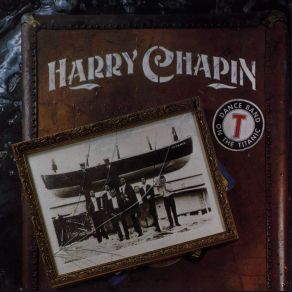Dance Band On the Titanic
Download links and information about Dance Band On the Titanic by Harry Chapin. This album was released in 1977 and it belongs to Rock, Pop, Songwriter/Lyricist, Contemporary Folk genres. It contains 14 tracks with total duration of 01:14:16 minutes.

|
|
|---|---|
| Artist: | Harry Chapin |
| Release date: | 1977 |
| Genre: | Rock, Pop, Songwriter/Lyricist, Contemporary Folk |
| Tracks: | 14 |
| Duration: | 01:14:16 |
| Buy it NOW at: | |
| Buy on iTunes $9.99 | |
| Buy on Amazon $0.99 | |
| Buy on Amazon $9.49 | |
Tracks
[Edit]| No. | Title | Length |
|---|---|---|
| 1. | Dance Band On the Titanic | 5:09 |
| 2. | Why Should People Stay the Same | 4:47 |
| 3. | My Old Lady | 3:52 |
| 4. | We Grew Up a Little Bit | 5:10 |
| 5. | Bluesman | 5:18 |
| 6. | Country Dreams | 4:47 |
| 7. | I Do It for You, Jane | 5:08 |
| 8. | I Wonder What Happened to Him | 4:07 |
| 9. | Paint a Picture of Yourself (Michael) | 3:52 |
| 10. | Mismatch | 4:55 |
| 11. | Mercenaries | 5:46 |
| 12. | Manhood | 3:48 |
| 13. | One Light In a Dark Valley (An Imitation Spiritual) | 3:26 |
| 14. | There Was Only One Choice | 14:11 |
Details
[Edit]Who would have figured, listening to the heart-on-his-sleeve sensibilities of Heads & Tales in 1972, that Harry Chapin would or could ever generate a wry, sly, sardonic double-LP (single CD) album like this? The diversity of this album is its strong point, the core of the record made up of straightforward, serious songs, most notably "We Grew up a Little Bit" and the gorgeous ballads "Mismatch" (arguably Chapin's prettiest song) and "I Do It for You, Jane" (of which the latter could have been a smash done countrypolitan style in Nashville), and there's one lean vignette into traditional music ("Bluesman"). But those are surrounded by some of the most bittersweet work of his career, including the title track, "Mercenaries," and "Manhood," not to mention the satirical, phantasmagoric "There Only Was One Choice," a 14-minute conceptual piece that conflates a bitter, sardonic look at the music business and the history of the United States, all looping back to the opener, "Dance Band on the Titanic." The whole album is dazzling in its range, from full-blown orchestrated numbers to solo acoustic-style tracks, and moods running from wide-eyed innocence to seething anger and frustration, all of it interesting and 95 percent of it highly entertaining as well. As with most of Chapin's work — but perhaps more so throughout this album — one gets the sense of an artist who desperately needed to break out of the boundaries of recording, onto a larger canvas; on this record, the music is so effective that he nearly made it, without ever actually breaking out to another format.